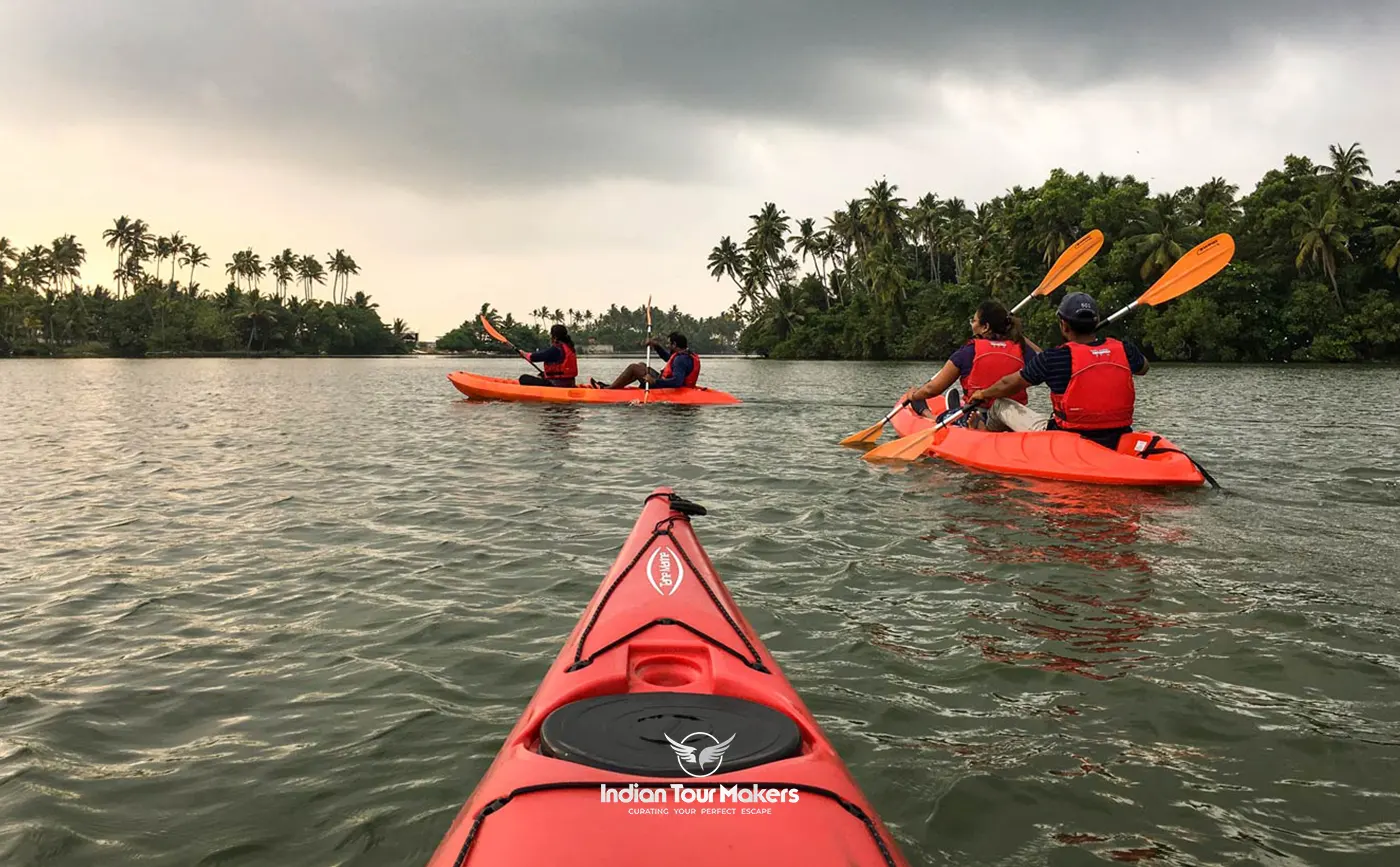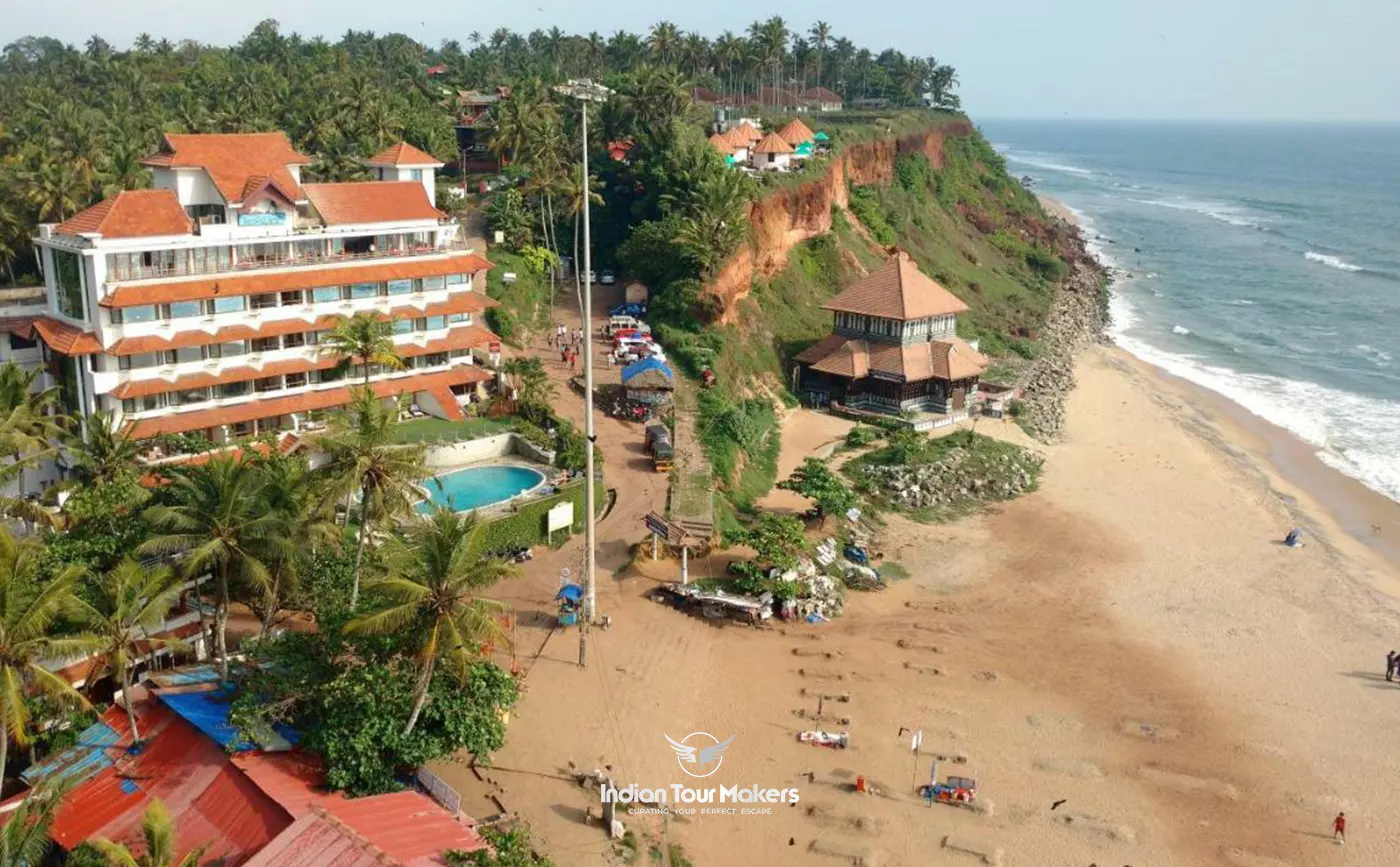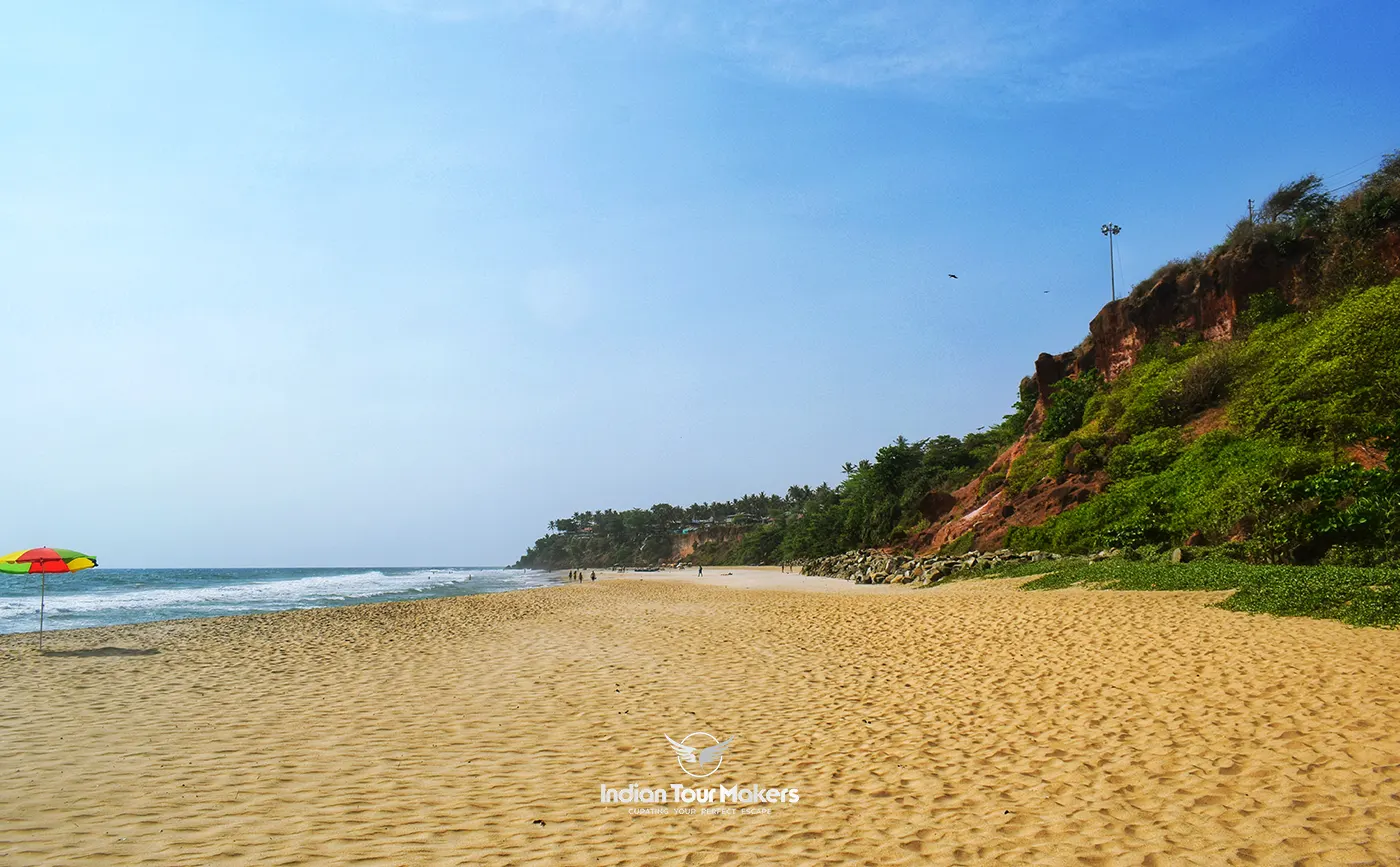




Welcome to Varkala, a serene seaside jewel nestled on the edge of Kerala. The moment your feet meet the sun-dusted golden sand, you’re transported into a world of tranquil harmony. The azure waves of the Arabian Sea gently whisper their soothing lullabies, their hypnotic rhythm connecting you to the pulse of the earth.
On the horizon, you’ll find an expansive tapestry of vivid blue, where the sky graciously meets the sea. As the daylight fades, the setting sun paints the sky with hues of orange and pink, each evening an original masterpiece.
A narrow path, bordered by lush greenery, leads to the renowned Varkala Cliff. Stand atop this unique geological formation and you are gifted with an unbeatable panorama. Feel the breeze, it carries the subtle scent of exotic spices and tropical flowers, a characteristic fragrance of this coastal paradise.
The rhythmic ringing of temple bells invites you inland, towards the 2,000-year-old Janardana Swami Temple, a sacred spot shrouded in age-old myths. Its grandeur is a fascinating blend of the ancient and the spiritual. Nearby, the Sivagiri Mutt, a pilgrimage centre, holds the teachings of Sri Narayana Guru, a social reformer and philosopher who significantly influenced the social landscape of Kerala.
Varkala’s culinary scene is a symphony of flavors. Fresh seafood, coconut-rich curries, and the crisp crunch of banana chips harmonize in a palate-pleasing melody. Try a steaming cup of chai at a local tea stall, its spiced aroma curling into the tropical air, a comforting lullaby in its own right.
Welcome to Varkala, where every experience is a blend of spiritual tranquility, natural beauty, and cultural richness. It’s time to leave the world behind and immerse yourself in this stunning coastal paradise. Come, be a part of Varkala’s magical symphony.
Varkala – An Awe-inspiring Historical Sojourn
Ancient Times
The earliest records of Varkala date back to the Sangam age (3rd century BC to 4th century AD). The region was then a part of the Ay kingdom, one of the earliest kingdoms in Kerala. Evidence of megalithic age relics and monuments hint at an even older civilization.
The Spiritual Link
The significance of Varkala amplified when the ancient Janardana Swami Temple, a place of profound Hindu worship, came into existence. The temple is believed to be around 2000 years old, with mythological associations to Lord Hanuman and the Pandavas from the Mahabharata.
Arrival of Europeans
By the 15th century, the Portuguese had discovered the Indian coast. Varkala became a frequented spot due to its strategic location on the west coast. A landmark event was the arrival of Vasco Da Gama, who initially landed in Kappad and later visited Varkala.
Sri Narayana Guru Era
The turning point in Varkala’s history was the arrival of Sri Narayana Guru, a revered social reformer and philosopher, in the late 19th century. He established the Sivagiri Mutt, which played a pivotal role in shaping Kerala’s social and spiritual landscape. His philosophy continues to influence the region, enhancing Varkala’s spiritual aura.
Modern Times
Today, Varkala has evolved into a popular tourist destination, renowned for its spectacular cliffs, pristine beaches, mineral springs, and vibrant history. The old-world charm blends seamlessly with the modern lifestyle, making Varkala an irresistible sojourn for those seeking a fulfilling vacation.
Location: Varkala is located in the southern part of Kerala, along the Arabian Sea coastline. It is approximately 50 km north of Thiruvananthapuram, the capital city of Kerala.
Languages Spoken: The most commonly spoken language is Malayalam. However, due to the influx of tourists, English is also widely spoken and understood.
Climate: Varkala has a tropical monsoon climate. Summers (March to June) are hot and humid while the monsoons (June to September) bring heavy rainfall. The winters (October to February) are pleasant, with temperatures ranging between 20°C to 30°C, making it the best time to visit.
Best Known For: Varkala is renowned for its breathtaking cliffs adjacent to the Arabian Sea, known as Varkala Cliff or Papanasam Beach. It’s also famous for the healing mineral springs and the 2000-year-old Janardana Swami Temple.
Popular Festivals: Major festivals celebrated in Varkala include Onam (the harvest festival), Vishu (the Kerala New Year), and the temple festival at Janardana Swami Temple. The Arattu festival, celebrated at the temple, is a grand spectacle that attracts numerous devotees.
Tourist Attractions: Key attractions include the Varkala Beach, Varkala Cliff, Janardana Swami Temple, Sivagiri Mutt, Anjengo Fort, Varkala Lighthouse, and the natural fisheries and springs.
Local Cuisine: Varkala’s cuisine is heavily influenced by the abundant availability of coconut and seafood. Popular dishes include Karimeen Pollichathu (pearl spot fish fry), Chemmeen Curry (prawn curry), Appam with Stew, and a variety of Kerala-style pickles. Don’t miss the refreshing tender coconut water and the delicious banana chips!
Winter (October to February): This is the best time to visit Varkala. The weather during these months is pleasantly cool and comfortable, with temperatures ranging between 20°C to 30°C. The warm sunshine and cool sea breezes make this the ideal season for beach hopping, sightseeing, or enjoying the vibrant local festivals. The beach becomes a serene sanctuary for those seeking a peaceful retreat from the chaos of everyday life.
Summer (March to June): Summer in Varkala can be hot and humid, with temperatures reaching up to 35°C. However, this also means fewer tourists, offering a quieter, less crowded experience. The evening sea breezes bring respite from the heat and provide the perfect backdrop for peaceful walks along the beach or cliff.
Monsoon (June to September): The monsoon paints Varkala with a different brush, transforming the landscape into a lush, verdant paradise. While heavy rains may disrupt outdoor activities, it is an ideal time for Ayurvedic treatments as the climate enhances the efficacy of the therapies. Do remember to carry your rain gear!
Remember, no matter the season, Varkala offers a unique charm that promises to captivate you at any time of the year.
By Air: The nearest airport to Varkala is Trivandrum International Airport, about 45 km away. The airport has good connectivity with major Indian cities and international destinations. From the airport, you can hire a taxi or take a bus to reach Varkala.
By Train: Varkala Sivagiri Railway Station is well-connected with key cities in India. Regular trains ply to and from cities like Kochi, Thiruvananthapuram, and Kozhikode. The station is around 3 km away from the main city, and taxis or autos can be used for the onward journey.
By Road: Varkala is well-connected by road to various cities in Kerala and neighbouring states. State-run KSRTC buses, as well as private buses, operate regular services. You can also choose to drive, taking in the picturesque views of Kerala’s landscapes along the way.
By Sea: For a unique experience, one can also reach Varkala by a ferry ride from Kollam, absorbing the scenic beauty of Kerala’s backwaters.
No matter which way you choose, the journey to Varkala is as mesmerizing as the destination itself.

Subscribe to see secret deals prices drop the moment you sign up!

